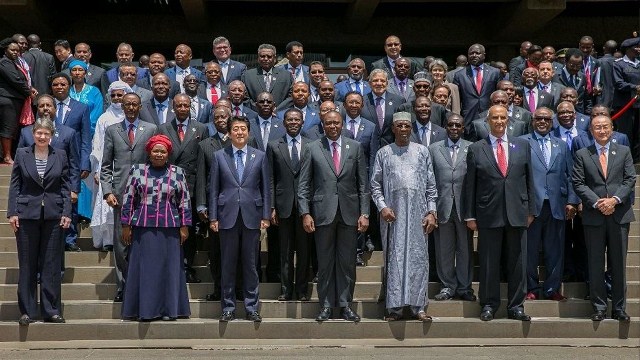 The two day meeting held in Nairobi-Kenya on August 27-28 was attended by close to 35 Heads of states and governments.
The two day meeting held in Nairobi-Kenya on August 27-28 was attended by close to 35 Heads of states and governments.
The Sixth Tokyo International Conference on African Development (TICAD VI) Summit took place for the first time in Africa at Kenya’s Kenyatta International Convention Center in Nairobi. About 35 African heads of state and government as well as their spouses attended the summit that opened last Saturday 27th August and ended on Sunday. The meeting also gathered members of the African Union Commission and close to 10,000 delegates from the economic community. The Japanese delegation was led by the Prime Minister Shinzo Abe who accompanied by chief executives of more than 80 major Japanese companies.
Kenyan president Uhuru Kenyatta opened the summit expressing satisfaction with the platform which allows Africa to discuss the development of the continent with its “friends”.
“It is only by coming together, to embrace partnership, mutual respect and long-term thinking that we can make the world more secure for the dreams of our people,” the Kenyan president said. He emphasized on the need to follow the path of Japan so as to trade more profitably with the world and push for “open and fair trade, deeper infrastructure integration and to develop the human resources of our people”. President Kenyatta acknowledged the impact of terrorism on the economic growth of the continent highlighting Kenya’s fight against militant groups through collaboration with neighbouring countries.
Several declarations and outcomes were reached at the end of this grandiose come together. The go as follows:
We, the Heads of State and Government and delegations of Japan and 54 African countries together with the representatives of 52 other partner countries, 74 international and regional organizations, representatives of the private sector and civil society organizations (CSOs) from both Japan and Africa met in Nairobi, Kenya, 27-28 August 2016, for the Sixth Tokyo International Conference on African Development (TICAD VI).
We welcome TICAD VI as the very first TICAD to be held in Africa. TICAD started in 1993 and has been serving as a pioneering multilateral forum for international cooperation on African development. Acknowledging the achievements made to date, we affirm that the first TICAD in Africa, which derives from a proposal from Africa itself, is a manifestation of African ownership of this process. We affirm that this occasion opens up a new chapter of the TICAD process.
We recognize that Africa is a dynamic continent that now hosts most of the fastest growing economies in the world. This has led to an increase in the number of countries that progressed from low income to middle income status. The continent is bestowed with rich natural resources and a fast growing population which is estimated to reach up to two billion in 2050. We especially acknowledge the growing middle class, which makes Africa a significant player in the global economy.
We affirm that TICAD is a unique process that has contributed remarkably to Africa’s development and regional integration agenda. It is a forum that promotes synergy with a candid and heart-to-heart communication among Africa, Japan and the international community and values the sense of equality and mutual benefit. We acknowledge the contribution made so far by all co-organizers to the TICAD process – the Government of Japan, the United Nations, the United Nations Development Programme (UNDP), the World Bank and the African Union Commission (AUC). Bearing in mind the high potential of this partnership, we reaffirm our strong commitment to continue to pursue the TICAD process with its distinctive elements stated below as its guiding principles:
Open and inclusive forum: TICAD is an open and inclusive forum built on the twin principles of African ownership and international partnership that continue to be strengthened. It mobilizes global support for Africa’s development by promoting continuous dialogue, collaboration, and voluntary initiatives among a wide range of actors.
Engagement of multi-stakeholders: TICAD engages multiple actors such as governments, international and regional organizations, private sector and CSOs, each with its own comparative advantages. TICAD process also promotes south-south and triangular cooperation within the framework of national and regional development programmes.
Alignment with Africa’s own agenda: TICAD is anchored on the conviction that Africa’s socio-economic transformation is central to global stability and prosperity. It prioritizes the Africa’s agenda, respects the continent’s dignity, and uses a pragmatic development paradigm and modalities to bring concrete results to support Africa’s development agenda.
Emphasis on human security and people-centered development: TICAD recognizes that the people of the African continent are the most precious resource and values each and every person’s effort. TICAD also recognizes that enhancing the capacity of each person and community is the key to sustainable development. This human security approach is aligned to Africa’s own aspiration for people-centered development.
Effective implementation with integrated follow-up mechanisms: TICAD has the three-tier follow-up mechanism (Joint Secretariat, Joint Monitoring Committee and Follow-up Meetings) with clear reporting which enhances the mutual accountability.
TICAD continues to play a unique role in the development dialogues on Africa through its innovative, open, multi-stakeholder approach, which provides for ample potential for its further evolution and transformation.
By Elise Kenimbeni (Source africanews.)




